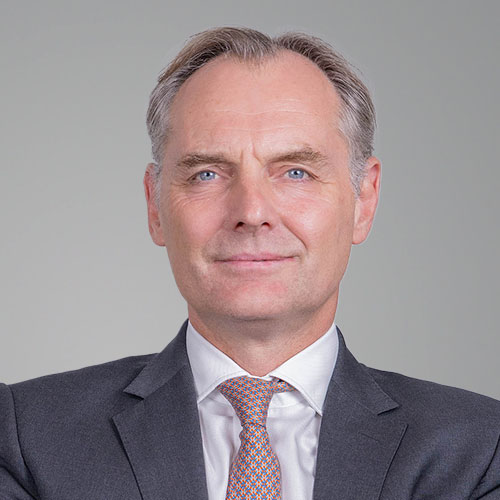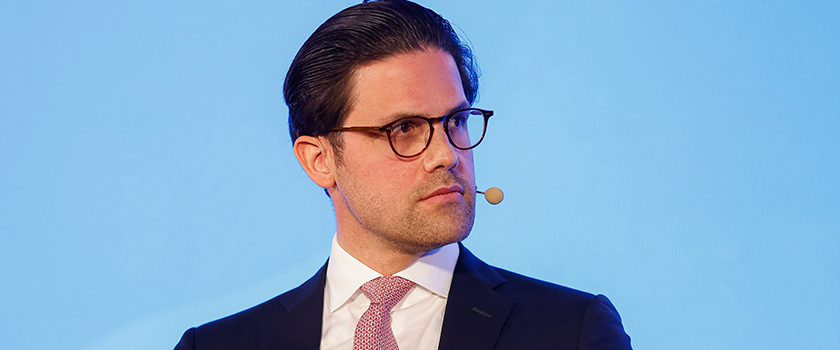Hedge funds are seeing positive inflows this year, says UBP’s Nicolas Faller, who also talked to us about his preferences in terms of bond and equity investments.
The below interview is an extract of the full conversation with Allnews, available here.
UBP’s assets under management (AuM) are approaching CHF 200 billion. The Geneva-based bank has recently made two acquisitions in its private banking business, which will add CHF 25 billion of AuM to the CHF 150.8 billion it had accumulated by end-June. But what about the asset management business? What are the growth areas and how are clients behaving? Nicolas Faller, CEO of UBP’s Asset Management business, answered Allnews’s questions:
In your opinion, which is the most promising destination for investors’ money: artificial intelligence (AI), energy transition or hedge funds?
AI, energy transition and hedge funds all show promise. It all depends how the portfolio is put together. Clients must be aware that if 80% of their portfolio consists of thematic funds, then its volatility could rise to 20-30%. They need to understand that we’re living in a world of decumulation.
What do you mean by decumulation?
The term means that most private-client wealth is held by clients who need income more than capital gains. Demographic trends mean that clients are living longer overall. They are less keen to gamble on a theme like AI than to protect their assets so that they can pass them onto the next generation.
The environment is fundamentally more favourable to products that deliver income, such as bonds. We can see the same phenomenon among institutional clients, because they need to fund pensions.
As long as AI delivers rapid earnings growth, there’s no problem, but back in August the markets became shockingly fixated on the earnings of one company: Nvidia. Portfolio managers cannot expose themselves to violent reactions to a single stock. Some valuations have risen to such an extent that if a company’s growth falls slightly short of expectations, it can cause its share price to plunge.
Is that a reason to take a fresh look at hedge funds?
The dislocation in some sectors is so great that the elastic will eventually snap. Hedge fund managers are best placed to take advantage of these new market inefficiencies.
There are several factors that make me optimistic about hedge funds, such as the positive interest-rate environment, the healthier market situation following the disappearance of many alternative managers, and above all market dislocation, which is now a source of profit for the first time in 10 years.
Hedge-fund portfolios have delivered a net return of 6% in Swiss-franc terms since the start of the year, after 10-12% in 2023. They are outperforming bonds. We’re moving back into an environment that’s more conducive to hedge funds.
Are you seeing money flowing into hedge funds?
We are starting to see that, yes. Many clients put off by hedge funds’ poor performance between the financial crisis and 2020 are starting to realise that the asset class is again offering good returns and including them in their asset allocation.
Which segments of the hedge fund market are attractive at the moment?
We’re less keen on the event-driven segment than the global macro and credit arbitrage segments, and we’re becoming more positive on long/short equity. We try to diversify exposure broadly in order to obtain a risk profile that delivers similar volatility to credit.
Has the hedge fund market shrunk drastically?
Investors have pulled out of hedge funds in Europe to some extent, whereas the market has remained stable in the US. Europe was slower to discover hedge funds, and bore full the full brunt of the 2008 crisis.
The hedge-fund industry has changed a lot, in terms of transparency for example. We’re confident about its potential following the structural changes that have taken place.
We’re also the only large Swiss bank that has kept large-scale capabilities in this area in terms of asset management, due diligence, portfolio construction and reporting.
That’s partly because some banks have pulled out of the hedge fund market in order to focus on private markets. UBP has also developed its private-market operations, but without scaling down our hedge-fund business.
How much of clients’ portfolios are invested in hedge funds?
Hedge funds make up around 10% of a balanced portfolio at UBP. That’s a significant figure: at many other banks it’s practically zero.
Outside of UBP – where alternative investments are part of the bank’s DNA – are private bankers risking their career if they recommend hedge funds?
Managers are risking their career if they offer hedge funds to clients without the necessary support. A bank must give a manager the resources to support clients, offering them solutions consisting of hedge-fund portfolios or individual hedge funds. That support is also necessary in the private-market segment.
UBP’s track record in hedge funds also allows us to give clients access to products that remain inaccessible in other banks.
Just because hedge funds are part of our DNA, that doesn’t mean that we invest in them indiscriminately or take a dogmatic approach. But we do believe strongly in the benefits they offer, even more so today than in the recent past.
What capabilities do you have in the hedge-fund market?
We employ around 25 professionals who focus exclusively on this asset class. We have moved closer to our clients and refocused our European activities on our Geneva and London offices, where we have research, asset management, due diligence and reporting teams. We have shut down our operation in the US, because we realised that proximity to US managers was leading to decisions in terms of fund selection and portfolio composition that were more suited to US clients than to European or Asian clients.
We also have some unique tools and we’re the only bank capable of providing clients with reporting that includes a consolidated analysis of all their hedge-fund positions held across all banks.
Are hedge funds appealing for Asian clients?
Asian clients may be the ones most interested in increasing their hedge-fund investments. We recently put together two large dedicated mandates for two major wealth managers in Hong Kong and Singapore. The situation facing Asian investors is complex. The Asian market has historically focused on equities and is highly dependent on China, and the Chinese equities market will remain complicated for the foreseeable future, more so than the Chinese bond market.
As a result, the Asian market has shifted a little towards fixed income and alternative investments such as private markets and now hedge funds, with investors aiming for returns 8-10% higher than those available from fixed income. Don’t forget that Asian clients were barely affected by the events that hit hedge funds in 2008.









